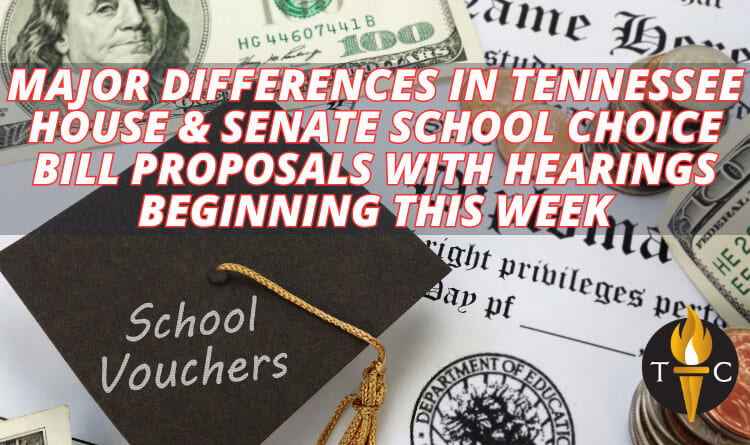Image Credit: Canva
The Tennessee Conservative [By Kelly M. Jackson] –
This week in their respective committees, the proposal for school choice that has been dangled by Governor Bill Lee for the past few years will be presented in both Tennessee House and Senate hearing rooms.
However, what is being proposed in one chamber, is vastly different from what is being proposed in the other.
Mainly, the much larger and benefit-packed 39-page House bill amendment, compared to the 17-page Senate bill that more closely resembles the original proposal from Governor Lee this past summer.
HB1183/SB0503 reads in its caption text: “Education – As introduced, extends from October to November, the time within which a public institution of higher education that receives funds from the distribution of credit cards to students or any percentage from the use of cards bearing the college or university name or logo must report the amount of such funds or percentage received as well as how the funds were expended during the previous fiscal year to the education committee of the senate and the education administration committee of the house of representatives. – Amends TCA Title 4; Title 8 and Title 49.”
This language on its face does not allude to the major differences between the companion bills. We want to enumerate these differences here, for readers to evaluate for themselves.
As a reminder the definition of the word ‘entitlement”, in this context means, “the right to a particular privilege or benefit, granted by law or custom.”
This would be akin to something like universal basic income, or our welfare system.
Under the section entitled “Payment- State or Local Benefit. Subsection (a) (2) clearly states, the scholarship “is a state or local public benefit for purposes of the Eligibility Verification for Entitlements Act, compiled in title 4, chapter 58.”
EVEA, or Tennessee Eligibility Verification for Entitlements Act, requires state public institutions of higher education to verify that anyone seeking a “state public benefit” is a United States citizen or otherwise lawfully present in the United States.
However, the law excludes those under 18, and when compounded by the Immigration Reform and Control Act of 1986, and the Supreme Court precedent of Plyler v. Doe, you have a mechanism for funding these “scholarships” for any child who may not be a US citizen, and our state legislators will be able to, according to them, do nothing about it.
The ultimate cost of the program has yet to be determined since as the program persists, the costs are anticipated to increase, as has been seen in other states like AZ who have school voucher programs in place.
The initial cost for the taxpayer funded grants, (20,000 in all) is $141.5 million dollars. If costs should soar as has been the case in AZ, the cost may end up exceeding the initial budget expectations.
The state of Tennessee is compelled by law to have a balanced budget, in layman’s terms, this means that the budget has to show the money coming from a specific source, and it is accounted for.
A task that could become a challenge as the years progress.
A recent report did a thorough job of enumerating the differences between the proposals, and where they overlap.
Common to all Senate and House versions of the proposal are:
• 20,000 Education Freedom Scholarships funded in 2024-25 school year, universal eligibility in 2025.
• Certain homeschoolers registered with a private umbrella school eligible to participate.
• Scholarship amount would be the base per-pupil funding amount outlined in the Tennessee Investment in Student Achievement (TISA) formula.
• Scholarship funds can be used for tuition, textbooks, tutoring, transportation, tech, summer school, AP exams, and educational therapy.
The Governor’s proposals, which are filed on both the House and Senate include the following:
• No testing requirements – parent satisfaction is the measure of success.
• No direct changes to public school enrollment, testing requirements, or benefits.
An Amendment filed in the Senate named for its author Senator John Lundberg (R-D4-Bristol) adds the following to the bill:
• Creates open enrollment for public schools, so families can choose to attend public schools in neighboring districts, as long as there are seats available.
• Would require participants to take annual tests approved by the State Board of Education, require third and eighth graders to take the TCAP, and require eleventh graders to take a postsecondary readiness exam like the ACT or SAT.
And finally, the behemoth-sized amendment added to the Senate proposal, which will not only create a mechanism to finance the so-called “scholarships”, but also do a decent job of rearranging the current education system in Tennessee.
And while there is no argument from either side of the aisle that there needs to be some serious overhauling of that system, whether the following is the remedy for what ails it, is arguably questionable.
The House Public School omnibus includes:
-Overhauls state TCAP testing requirements:
- Clarifies no testing required from Kindergarten to second grade;
- Eliminates TCAP requirement for grades 3-12, and instead requires:
a. English language arts and math assessments annually in grades 3 through 9
b. Three statewide standardized science tests, once in grades 3-5, once in 6-9, and once in 10-12.
c. One statewide standardized social studies test once during grades 6-8;
d. A postsecondary readiness test (like ACT or SAT) in grade 11.
e. A statewide standardized test required by the federal Every Student Succeeds Act.
-Folds the state’s Achievement School District into the Tennessee Department of Education under the purview of the Education Commissioner and overhauls its functionality.
-Shuts down the ASD on July 1, 2026.
-Authorizes the State Board of Education to create rules and policies to evaluate teachers’ and principals’ performance.
-Delays evaluations for high-performing teachers and principals for one to three years, depending on achievement levels.
-Authorizes state-funded health care plans for public school teachers and public charter schoolteachers.
-Education Freedom Scholarship participants would be required to take the same tests as outlined for public and charter school students.
-Children of lawmakers and governor’s cabinet, including commissioners and staff directors, would be excluded from participating in the program.
-Participants who participated in a sport for a district public school during the immediately preceding year may not participate in that sport for the first year they attend a private school on a scholarship in the same district. If they move outside their original school district, the exception does not apply.
-Department must provide an annual report on the number of scholarships, parental satisfaction, and academic performance of participants by Feb 15 each year.
Some of the most notable changes are the integration of a state funded insurance provision for teachers, removing much of the burden for those costs from counties.
Also notable, are the elimination of some standardized tests that are required for public school students, which means the program’s efficacy will be based on outsourced data collection of academic outcomes, and parent satisfaction feedback, also gathered by an outsourced data collection apparatus.
HB1183 is scheduled to be heard on 2/27 in the House K-12 Subcommittee. Its partner, SB0503 is scheduled to be presented on 2/28 in the Senate Education Committee.
The bills are being carried by Representative William Lamberth (R-D44-Portland) and Senator Jack Johnson (R-D27-Franklin).

About the Author: Kelly Jackson is a recent escapee from corporate America, and a California refugee to Tennessee. Christ follower, Wife and Mom of three amazing teenagers. She has a BA in Comm from Point Loma Nazarene University, and has a background in law enforcement and human resources. Since the summer of 2020, she has spent any and all free time in the trenches with local grassroots orgs, including Mom’s for Liberty Williamson County and Tennessee Stands as a core member. Outspoken advocate for parents rights, medical freedom, and individual liberty. Kelly can be reached at kelly@tennesseeconservativenews.com.













